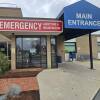As migrants continue to arrive in Massachusetts, medical professionals and policymakers are reviewing how health services stepped in to help them — beginning with the unexpected arrival of 50 people on Martha’s Vineyard last September.
The Thursday event, hosted by the Massachusetts Health and Hospital Association, looked at past and present challenges in refugee care, and what steps need to be taken for the future.
Denise Schepici, CEO of Martha’s Vineyard Hospital, was in a restaurant when she got a call from her colleague saying a group of migrants — who had no idea where they were — had just arrived. She said luckily, the hospital was “well-oiled” from the pandemic, and activated its emergency response center.
“Some of these folks had traveled 60 days in the jungle,” Schepici said, in reference to the path many migrants take to reach Mexico and the border, through the notorious Darien Gap in Panama. “We had no idea what to expect for injuries and illness.” The hospital was on constant calls with the state, sometimes hourly.

The emergency department saw eight patients with immediate needs, including an immigrant with a broken jaw, according to Claire Seguin, chief nursing officer and chief operating officer at the hospital.
“Some those were young, very young children,” she said. The hospital also had emergency credentialing for staff in case additional support was needed.
“It was an incredible humanitarian response at a terrible time in politics,” said Schepici.
The arrival came as hospitals continued to be strained around Massachusetts with capacity issues because of the pandemic. The hospital didn’t end up being over capacity during the September crisis. “We did a really tremendous job. That was definitely a worry, but making sure that people got the right care in the right place,” said Schepici. She said people who needed dental care were triaged to a local dentist. But emergency cases ended up with the hospital.
Rep. Dylan Fernandes represents the area and said that one improvement he would have liked to see is having one individual who centrally coordinated everyone.
“Within like 10 days or two weeks at Cape Cod, we were like OK, we need someone driving the entire bus here,” he said. Schepici agreed.
“We need to build a consortium in individual cities and towns, where we can extend the arm when a coordinated effort like this is needed,” she said.
A second panel of speakers addressed how Massachusetts is currently dealing with the ongoing crisis. At Boston Medical Center’s Immigrant and Refugee Health Center, staff saw 500 Afghan immigrants in a single day after the U.S. left Afghanistan, said Dr. Sarah Kimball, director at the center.
They were met with long-established trauma and health services. But as more immigrants from Haiti and Latin America arrive — sometimes over 100 families a month, continuously — it can be a struggle for the hospital. There’s been a “huge number” of new arrivals in the late state of pregnancy who need prenatal care, she said. But others just need a roof over their heads.
“They're looking mostly for housing, not medical needs,” said Kimball. “It’s been a really interesting moment to think about how we do that, because while I want everyone to be safe and I want them to have housing, for those of you who haven't hung out in a pediatric emergency room, it's not a place where you would want to go if you didn't have to go there.”
Dr. Fiona Danaher said Massachusetts General Brigham’s Center for Immigrant Health, which she directs, has helped over 100 migrant families in collaboration with nonprofit La Colaborativa, which is based in Chelsea.
“We are often finding that these are folks who may have chronic medical conditions that have gone completely untreated throughout their entire journey,” she said. Those individuals, she said, had medications confiscated while in Border Patrol custody at the border. “There are a lot of unaddressed medical needs on top of the urgent social issues,” she said.








